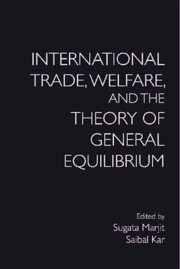Book contents
- Frontmatter
- Contents
- List of Figures and Tables
- Introduction
- 1 Thoughts and Remarks after 50 Years of Simple General Equilibrium Models
- 2 Adjustment Costs and Trade Liberalization
- 3 Farsightedly Stable FTA Structures: The Roles of Preexisting Tariff Rates
- 4 Skilled–Unskilled Wage Inequality and Dynamic Skill Accumulation: A Theoretical Analysis
- 5 FDI in Education vs FDI in Commodity Production: A Theoretical Model
- 6 Skilled Migration and Foreign Aid in a General Equilibrium Model of Monopolistic Competition
- 7 Trade, Factor Flows, and Product Variety in a Small Open Economy
- 8 Product Differentiation, Quality of Innovation, and Capital Mobility: A General Equilibrium Analysis
- 9 Cross-Border Mergers and International Trade: A Vertical GOLE Model
- 10 International Trade and Production Organization: A Review of Contemporary Literature
- 11 Negative Production Externalities, Labor Market Imperfection, and Production Tax Policy in a Developing Economy
- 12 Tax-Financed Public Transfers: A Mechanism for Double Taxation
- Contributors
- Index
1 - Thoughts and Remarks after 50 Years of Simple General Equilibrium Models
Published online by Cambridge University Press: 01 November 2018
- Frontmatter
- Contents
- List of Figures and Tables
- Introduction
- 1 Thoughts and Remarks after 50 Years of Simple General Equilibrium Models
- 2 Adjustment Costs and Trade Liberalization
- 3 Farsightedly Stable FTA Structures: The Roles of Preexisting Tariff Rates
- 4 Skilled–Unskilled Wage Inequality and Dynamic Skill Accumulation: A Theoretical Analysis
- 5 FDI in Education vs FDI in Commodity Production: A Theoretical Model
- 6 Skilled Migration and Foreign Aid in a General Equilibrium Model of Monopolistic Competition
- 7 Trade, Factor Flows, and Product Variety in a Small Open Economy
- 8 Product Differentiation, Quality of Innovation, and Capital Mobility: A General Equilibrium Analysis
- 9 Cross-Border Mergers and International Trade: A Vertical GOLE Model
- 10 International Trade and Production Organization: A Review of Contemporary Literature
- 11 Negative Production Externalities, Labor Market Imperfection, and Production Tax Policy in a Developing Economy
- 12 Tax-Financed Public Transfers: A Mechanism for Double Taxation
- Contributors
- Index
Summary
Introduction
‘The Structure of Simple General Equilibrium Models,’ published in 1965, has been a popular paper, although it was not my first article. I will first explain as to why this paper was written and then I shall make some remarks about general equilibrium models as used in the theory of International Trade.
Early in the 1960s, at the University of Rochester, we hired Robert Fogel who was finishing his graduate work at Johns Hopkins University. At Rochester, our new department was led by our new Chairman, Lionel Mckenzie. Fogel was at the early stage of his career with focus on economic history. He wanted to use basic economic theory in his work, which at that time, focused on explaining the importance of the development of railroads and how it contributed to the growth in the United States in the mid-nineteenth century while the West was being developed. This was a novel idea among economists studying economic history, but was not generally welcomed by scholars of History. Lionel developed our department by hiring young scholars who would focus on areas such as Labor, International Trade, or other applied areas, and would also expose how basic economic theory was essential in explaining major results in applied areas. Lionel asked me to explain to Bob some of the essentials of General Equilibrium Theory that might be useful to Bob's research. I agreed, explaining to Bob that I would try to make it simple for him and making it simpler would also help me gain a better insight of the theory.
Simplifications
As ascertained by my paper, I thought that traditional approaches to the subject matter found in GE theory were more complicated than need be. Apart from similar questions that mathematical theorists were most concerned about, such as, assumptions leading to existence, economists would be more interested in observing causes behind a new equilibrium with spillover effects. The mathematical formulations are preoccupied with establishing conditions that support assumptions for ensuring existence of competitive markets. It simultaneously produces well-defined equilibria that are stable, perhaps unique, and those which reveal interesting normative properties. Economists have always been more interested in applying how changes that may take place in one market would cause new equilibria to be established in other markets, that is, general equilibrium as opposed to partial equilibrium.
- Type
- Chapter
- Information
- Publisher: Cambridge University PressPrint publication year: 2018
- 1
- Cited by



